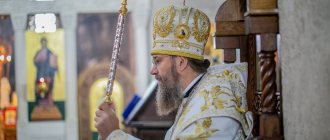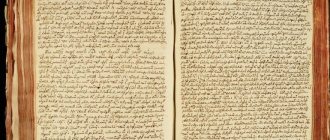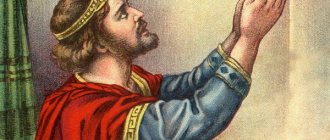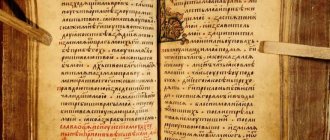Psalm 87 read:
O Lord God of my salvation, I have cried before you by day and by night; Let my prayer come before you; incline your ear to my prayer. For my soul is filled with evil, and my belly is drawing near to hell. It was used with those descending into the ditch; like a man without help, there is freedom in the dead; Like the ulcers sleeping in the tomb, you did not remember them, and they were rejected by your hand. Placing me in the pit of hell, in the dark and shadow of death. Thy wrath was established upon me, and all thy waves were brought upon me. You have removed all those I know from me; making me an abomination to myself; betrayed without ever leaving. My eyes are weary from poverty; I have cried to you, O Lord, all day long; I have lifted up my hands to you. Eating dead people work wonders? Or will the doctors be resurrected and confess to you? Food story: who is your mercy in the grave, and your truth in destruction? Will your miracles be known in darkness, and your righteousness in forgotten lands? And I cried to you, Lord, and my morning prayer will precede you. For what purpose, Lord, will you give away my soul? do you turn your face away from me? I am poor and in labor from my youth; I was lifted up, humbled and faint. Your wrath has come upon me, your terror has troubled me; it washed over me like water all day long, and overpowered me. You have removed from me a friend, both sincere and those who know me from passions.
Psalm 37
This psalm was supposedly written by King David during the rebellion of his own son Absalom against him and represents an example of deep humility and repentance.
Unzosha - “pierced.”
Slákókhsya - “bent over, wilted.”
Setuya - “sad.”
Lyadvia (For my Lyadvia is filled with reproach, and there is no healing in my flesh) - “loins, thighs.” Saint Athanasius the Great, interpreting this psalm, notes that this phrase may be talking about possible bodily illnesses - a consequence of sin.
Yako here means “because”.
Do zelá (resigned to zelá) - “very, to the extreme.” Before us is not the already familiar adverb zelo, but a noun that declines. It meant "strength". One of the few words starting with the mysterious letter “zelo”, named after either the noun or the adverb zelo. Among its cognates were zelost (also “strength”), zely “strong” and zelny (also “strong”), which is quite similar to its Russian counterpart. The fact that the word “strong” also existed in Church Slavonic at the same time suggests borrowing.
There are unusually few words starting with the letter “zelo,” which in ancient times corresponded to the sound “dz.” This also suggests that perhaps all the words in it, including hare, snake, beast, star, evil, cereal and potion, are borrowings from some closely related language. The graphic representation of the letter “zelo” as a crossed out “z” (“earth”) also perhaps indicates that it appeared after the main letter “z”.
Rykakh - “roared, groaned.”
To my eyes (the light to my eyes) - “my eyes.” This is the genitive case of the dual number that existed in the word eye for the reason that a person has only two eyes. Archaism has been preserved in the Russian language in person. In Church Slavonic this would mean “in the eyes.”
Sincerely - “neighbors”. In the Church Slavonic language there was a synonym for the word blizhny: the word sincere, which comes from the Old Slavic spark with the meaning “close” (with the prefix is-/iz-) and is related to the word edge. The modern meaning of the word sincere in Russian is connected precisely with this original meaning: our neighbors were truly sincere, that is, people truly close to us. True, not always, as these lines of the psalm show: here the closest and most sincere people moved away from the psalmist.
Right opposite".
Stasha - “steel”.
Far away - “distant, far away.”
Needy (needy, those seeking my soul) - “were exhausted.”
Reproof (not having reproach in your mouth) - “reproach.”
Rekh - “said”. Church Slavonic had several past tenses for verbs. For example, this form is aorist, which translates as an instant action performed in the past. It is not very easy to understand, since there are no analogues in our system of grammatical tenses.
In addition to the aorist, there were other forms of the past tense, both perfective and imperfect. For example, you can find the forms rekokh, rek, rekl is, rekl bykh and rech. The latter is translated in both past and present tense.
Do not forget also about changing verbs by persons and numbers (conjugation). For example, resha means “they said,” and resta means “they said” in the dual number (when there were only two speakers). Rtsem - “we say/we will say.” Conclusion: if the desired word is not in the dictionary, look in textbooks and reference books. Most likely, it will appear in some conjugation table.
They will make me happy - “they will rejoice (about) me.” The Church Slavonic language is generally rich in inverse (confused) constructions. For example, may my enemies never rejoice over me - “may my enemies never rejoice over me.”
Vegda - “when”. The Church Slavonic language is also rich in synonyms. The word when already sounded a little higher, so in order not to repeat itself, here is its synonym.
Velerechevasha - “they talked a lot, boasted, slandered.”
Vynu - “always.”
Páce - “more.”
Voz (Who repays me evil is a cart of good) - “for.” All verb prefixes come from prepositions. The preposition cart, which became a prefix in the word “rewarding,” also existed separately. And even earlier, these were two prepositions - in and for, which decided to combine into one new one.
Zane - “because.”
Gonyakh - “sought.” Pursuing goodness - “striving for justice (or goodness).”
Wonmi - “hear.” Listen to my help - “hear to help me.” In the Hebrew original, “hasten to my aid.”
Psalm 87 in Russian:
Lord, God of my salvation! I cry day and night before You: let my prayer come before Your face; incline Your ear to my prayer, for my soul is filled with adversity, and my life has approached hell. I have become equal to those who go down to the grave; I became like a man without strength, thrown among the dead, like the slain lying in the tomb, whom You no longer remember and who are rejected from Your hand. You put me in the pit of the grave, in darkness, in the abyss. Thy wrath is heavy upon me, and with all Thy waves Thou hast struck me. You have removed my acquaintances from me, you have made me disgusting to them; I am imprisoned and cannot leave. My eye is weary with grief: all day long I have cried out to You, O Lord, I have stretched out my hands to You. Will You perform a miracle on the dead? Will the dead rise and praise You? or will Thy mercy be proclaimed in the grave, and Thy truth in a place of corruption? will Thy wonders be known in darkness, and Thy righteousness in the land of forgetfulness? But I cry to You, Lord, and early in the morning my prayer precedes You. Why, Lord, do you tear away my soul, hide Your face from me? I am unhappy and have been fading since my youth; I bear Your terrors and am exhausted. Thy wrath has passed over me, Thy terrors have crushed me, every day they surround me like water: they encircle me all together. You removed from me a friend and a sincere one; my friends are not visible.
Psalm 87 Psalm
1 Song. Psalm of the sons of Korah. To the head of the choir. On the mahalaf. For singing. Teachings of Heman Ezrahite.
Commentary from the Geneva Bible: Psalm 87 Psalm
Ps. 87 This psalm is perhaps the most tragic of all the laments in the Psalter. However, it is devoid of a sense of pessimism and doom, since it begins with the words: “God of my salvation!” (v. 2).
87:2 God of my salvation! Even in the deepest despair, the psalmist never ceases to realize that God is his hope and salvation.
during the day. and at night. In other words, incessantly.
87:4 My life is drawn near to hell. In this case, it is unclear what kind of disasters are plaguing the psalmist. However, it is obvious that these words would be most appropriate in the mouth of a person facing imminent death.
87:6 thrown among the dead. The psalmist is in a state of extreme loneliness, perhaps caused by a sense of abandonment by God.
who are cut off from Your hand. Those. abandoned by God. It should be remembered that initially the Lord did not reveal to people the fullness of the truth, especially with regard to the posthumous fate of man. While some psalms reflect hope for eternal life, the creators of others, including Ps. 87, clearly lack this understanding.
87:8 Thy wrath. The psalmist is confident that his condition is a consequence of God’s wrath, which he brought upon himself, and he is primarily concerned with the reasons for God’s disfavor.
87:9 made me disgusting. The psalmist's suffering is similar to the trials that befell Job.
87:10 I stretched out my hands to You. Hands outstretched to heaven are a common prayer posture in Old Testament times.
87:11 Will You work a miracle on the dead? See com. to Ps. 29.10.
87:15 You are tearing away my soul. Those. “You are taking away your soul.”
87:18 like water. See com. to Ps. 17.5; 68.2.
87:19 You have removed from me a friend and a sincere one. The psalmist's closest friends abandoned him, as if following God Himself (v. 9). This psalm, one of the few, ends on a mournful note (see Introduction: Characteristics and Themes).
2017. Made with love for those who love and seek God.
Psalm 87 listen:
Psalm 87 is the saddest, most joyless in the Psalter. Its author was Heman, a contemporary of David, devoted to him and sharing with him his life’s misadventures, so perhaps the psalm was written about some serious disaster experienced by David, perhaps persecution from Absalom, which is confirmed by the content of the psalm, where David is depicted as abandoned by friends in disasters from which he sees no way out. The psalm is full of complaints about the hopelessness of the situation, the nearness of death from enemies and the awareness of one’s complete defenselessness.
Read the Psalter
Text
Hebrew Bible Version
The following is the Hebrew text of Psalm 87:[2]
| Poem | Hebrew |
| 1 | Please contact us ׁ |
| 2 | Please contact us קֹֽב |
| 3 | נִכָּ֣ר |
| 4 | אַזְכִּ֚יר | Home ֻלַּד־שָֽׁם |
| 5 | וּֽלְצִיּ֨וֹן יֵֽאָמַ֗ר אִ֣ישׁ וְ֖אִישׁ יֻלַּד־בָּ֑הּ וְה֖וּא יְ כֽוֹנְנֶ֣הָ עֶלְיֽוֹן |
| 6 | Please contact us |
| 7 | וְשָׁרִ֥ים כְּחֹֽלְלִ֑ים כָּֽל־מַעְיָנַ֣י בָּֽךְ |
King James Version
Below is the complete English text of the Psalm from the King James Bible.
Psalm or song for the sons of Korah.
- Its foundation is located in the holy mountains.
- The Lord loves the gates of Zion more than all the dwellings of Jacob.
- Glorious deeds are spoken about you, city of God. She sat down.
- I will mention Rahab and Babylon to those who know me: behold Philistia and Tire with Ethiopia; this man was born there.
- About Zion it will be said: “This and that man was born in her,” and the Most High Himself will establish her.
- The Lord will consider it when the people write that this man was born there. She sat down.
- There will be both singers and musicians playing instruments: all my sources are in you.
About getting rid of severe grief
— — — — — — — — — — — — — — — — — — — — — — — —
Lord God of my salvation, I cried out before You in the days and in the nights: Let my prayer come before You, Incline Your ear to my prayer, For my soul is filled with evil, And my belly draws near to hell.
He was used with those descending into the ditch, Like a man without help, There was freedom in the dead: Like the ulcers sleeping in the tomb, Whom you did not remember, And they were rejected from Your hand.
Having laid me in the pit of the underworld, in the dark and shadow of death: Thy wrath was established upon me, and Thou broughtest all Thy waves upon me.
You removed those who knew me from me: Having made me an abomination to yourself: I was betrayed and did not depart. My eyes are exhausted from poverty: I have cried out to You, O Lord, all day long, I have lifted up my hands to You.
Eating the dead works wonders; Or the doctors will resurrect and confess to You; The story of who is in the grave is Your mercy, And Your truth in destruction;
Thy wonders will be known in the darkness, And Thy righteousness will be known in the forgotten lands; And I cried out to You, Lord, and my morning prayer will precede You.
O Lord, take away my soul; You turn Your face away from me; I am poor, and in labor from my youth: I ascended, humbled and faint.
Thy wrath has passed over me, Thy intimidation has disturbed me: It has washed over me like water all day long, and has overcome me all together. You removed from me a friend and a sincere one, And those I knew from passions.
In Russian. An educational text for understanding unfamiliar words and expressions of the Church Slavonic language.
About getting rid of severe grief
— — — — — — — — — — — — — — — — — — — — — — — —
Lord, God of my salvation! Day and night I cry before You: Let my prayer come before Your face; Incline Your ear to my prayer, For my soul is filled with disasters, And my life has approached hell.
I have become equal to those who go down to the grave; I became like a man without strength, thrown among the dead, like the dead lying in the tomb, whom You no longer remember and who were rejected from Your hand.
You put me in the pit of hell, in darkness, in the abyss. Your wrath has become heavy upon me, and with all Your waves You have struck me.
You have removed my acquaintances from me, You have made me disgusting to them; I am imprisoned and cannot leave. My eye is weary with grief: All day long I have cried out to You, O Lord, I have stretched out my hands to You.
Will You perform a miracle on the dead? Will the dead rise and praise You? Or will Your mercy be proclaimed in the grave, And Your truth in a place of corruption?
Will Thy wonders be known in darkness, And Thy righteousness in the land of oblivion? But I cry to You, Lord, And early in the morning my prayer precedes You.
Why, Lord, do you tear away my soul, hide your face from me? I am unhappy and have been fading since my youth; I bear Your horrors and am exhausted.
Thy wrath has passed over me, Thy fears have crushed me, Every day they surround me like water: They encircle me all together. You removed from me a friend and a sincere one; My friends are not visible.
PRAYER RULE FOR COMMUNION (sample of preparation during the week):
Monday
(according to secular style - on Sunday evening after Little Compline): Canon of Repentance to our Lord Jesus Christ.
Tuesday
: Canon of prayer to the Most Holy Theotokos.
Wednesday
: Canon to the Guardian Angel.
Thursday
: Canon to Saint John the Baptist.
Friday
: Canon, Akathist or prayers to your patron saint, whose name you bear.
Saturday
: To the Sweetest Jesus.
Sunday
: the first (evening) part of the procession to Holy Communion. The second (morning) part of the sequence is read after the 1st hour.
Attendance at the Divine Liturgy on Sunday is a MANDATORY and IMMEDIATE rule for an Orthodox believer, as is the communion of the Holy Mysteries of Christ. An exception to this RULE is possible only due to a serious or contagious illness, as well as in the event of a natural or social disaster, when it is impossible to get to church.
Note: in this prayer rule and the attached Orthodox calendar, the beginning of a new day is considered to be 18:00.




